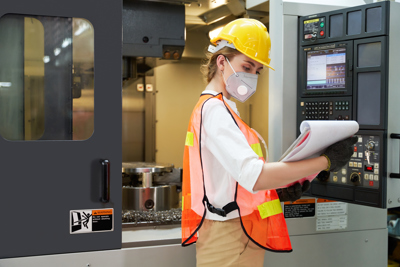The main way in which trust can manifest itself is through data. Regulated businesses frequently need to share data with regulators and the government, but more and more companies are willingly sharing data with their wider ecosystem (such as their prospective customers and partners) to show that their operations can be trusted.
This yields a number of benefits. For instance, it helps staff to understand the company and improve how they work, in turn attracting talent to the business. Data access will also aid the building of connections, boosting engagement with supply chain partners. Plus, when data is shared, it becomes a trend – and a positive one at that. Other businesses may take a leaf out of your book and share their data too, leading to enhanced understanding of the industry and better outcomes all round.
Data sharing comes in a range of forms – from your hiring practices and your charitable giving to those more related to the manufacturing process, such as product information (like safety measures), data sharing agreements (how privacy is protected), and your social, economic and environmental impact. Makers have to balance data collection so that it’s only gathered in a way that’s ethical and valuable to both their customers and wider society, and can still help to increase their trust.

The importance of customer trust in the digital age
Your guide to the importance of customer trust in the digital age

Customer trust is incredibly important to manufacturing businesses – and not just large corporations or B2C companies either. Through trust, SMEs can create a unique selling point that they can then use as a competitive advantage.
If you home in on the power of trust and use it to promote yourself, you’ll unlock a wide variety of long-term benefits. Here, we explore what improving customer trust could do for your business, how to help secure it, and the role that technology can play.
Download the guide-
Get the most from your data
-
Show your expertise
If you have trust, then you’ll boost your brand image and awareness. But in order to secure that, you’ll want to work on your marketing to ensure you’re known in your industry. After all, why would someone trust a brand they’ve never heard of before?
Trust will enable you to be perceived as an expert in your field – that is, as long as you demonstrate your proficiency, which can often come from heritage and experience. Family businesses and makers with many years under their belt really benefit in this regard. Yet newer entrants to the industry can also show they’re knowledgeable by increasing their team’s know-how and promoting their expertise using platforms like their website, social media channels, and events and exhibitions.
Of course, there’s another side to this too. If you suffer a lack of trust, then this can work in the opposite way, negatively impacting your reputation. -
Improve your traceability
Traceability can be quite the process as you have to go beyond your own company and work with those in your supply chain, but the impact on your levels of trust can be enormous.
For instance, in partnership with your supply chain, you could create a QR code for your products which will allow customers to see the full journey it has made to reach them. Consumers like to know where a purchase has come from – and not just the context behind it, but the personality too. This will help give it transparency and provide a personal experience, making your brand more approachable in the process.
As long as your supply chain meets your own high standards, and the standards that your customers have come to expect, traceability can even help you justify premium pricing. -
Go local
Something that is key to trust is helping your community. By using local companies and suppliers, and employing local people where possible, you can become well-known in the immediate area. The benefit of this is twofold: you improve your trust levels, and you’re likely to make new business connections too.
We’ve all heard of the trend to ‘shop local’, accelerated by the pandemic, so it’s definitely worth jumping on the bandwagon sooner to ensure you don’t get left behind. -
Consider your corporate social responsibility
One of the ultimate ways to amplify your trust is to work on your corporate social responsibility initiatives. Key to this is having a green agenda; given that manufacturing is the third-largest direct greenhouse gas emitting sector (at a 15% contribution), every maker has a role to play in helping the UK reach net zero.
The Cradle to Cradle Certified Product Standard could be a key consideration for your business. This is a globally recognised measure of safer and more sustainable products designed and manufactured to contribute to the circular economy. With assessment categories including material reutilisation and renewable energy and carbon management, this will not only boost customer trust, but provide a point of differentiation by going beyond the legal requirements. -
Understand the role of technology
Due to the coronavirus pandemic, some makers have been impacted by their supply chain, which has caused delivery issues. Because of a lack of transparency, a major challenge has been to keep their customers effectively informed – throwing the spotlight on the importance of technology in building a trustworthy brand.
Digital tools can give you objective data, for example, which can help offer transparency to your customers and prove your worth. Blockchain is one such technology, enabling you to provide unchangeable and highly secure information across your supply chain or to your clients. For example, blockchain-enabled digital trade platform we.trade uses smart contracts to make transactions more transparent. Details, conditions and payment terms are entered and confirmed by both the buyer and seller, and payment is automatically triggered when those conditions are met.
There’s also IBM Food Trust, which uses blockchain technology to connect companies in an ecosystem through a permissioned, permanent and shared record of food supply data. The aim is to build a more suitable food system, which will in turn lead to trust and boosted consumer confidence.
Efforts need to be made in relation to marketing and eCommerce technology too. Online configurators and virtual showrooms can be used to enhance the service you offer, prompting enhanced trust – particularly when it isn’t possible for people to see you in person! -
What Made Smarter can do for your business
Whilst digital tools can reap a lot of rewards in terms of customer trust, some makers are reluctant to use them due to perceived barriers. Many worry that technology will take away the handmade element of their product, for example. Yet it can still be homemade to some extent and marketed as such, you’re simply changing or improving the process in order to scale.
Likewise, introducing technologies into your business doesn’t have to be costly, and you can still adopt them even if you have traditional or established processes in place. Made Smarter’s support can help you through:
• Specialised, impartial advice on the best tools for your business
• Digital transformation workshops to help you identify how to start your journey
• A leadership programme to provide the know-how to lead digital transformation
• Digital technology internships to offer a fresh perspective and injection of skillsAnd that’s not all. From match-funding to workforce development and upskilling, we offer a wide range of support so that your business can adopt technology successfully – and boost your customer trust in the process.
Curious to know more? Get in touch to speak to an expert adviser today. Alternatively, you can visit our website or take a look at a couple of our case studies below. -
Case Studies
- Contactless Check Solutions (CCS) - CCS has developed the first fire door management system to ensure that all fire doors are fully compliant and inspected regularly. It does this through the use of apps, which capture and remotely store real-time data relating to the door manufacture and installation – as well as the results of annual checks. This in turn helps to avoid situations like Grenfell Tower fire, giving people more confidence and trust that buildings are safer.
- Starlight Bedrooms - This Bolton-based business manufactures bespoke fitted furniture. After discovering that one of their customers’ main drivers is trust, they sought Made Smarter’s support to (among other things) integrate a customer management system and boost traceability when ordering materials from suppliers. More effective data capture gives greater visibility of the sales and production pipeline to also aid workflow planning and management.

